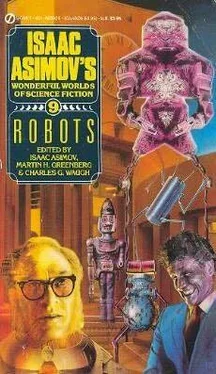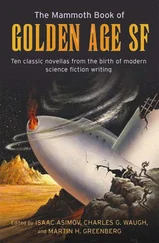Frederik Pohl - Isaac Asimov's Worlds of Science Fiction. Book 9 - Robots
Здесь есть возможность читать онлайн «Frederik Pohl - Isaac Asimov's Worlds of Science Fiction. Book 9 - Robots» весь текст электронной книги совершенно бесплатно (целиком полную версию без сокращений). В некоторых случаях можно слушать аудио, скачать через торрент в формате fb2 и присутствует краткое содержание. Год выпуска: 1989, ISBN: 1989, Издательство: Robinson Publishing, Жанр: Фантастика и фэнтези, на английском языке. Описание произведения, (предисловие) а так же отзывы посетителей доступны на портале библиотеки ЛибКат.
- Название:Isaac Asimov's Worlds of Science Fiction. Book 9: Robots
- Автор:
- Издательство:Robinson Publishing
- Жанр:
- Год:1989
- ISBN:ISBN: 1-85487-041-6
- Рейтинг книги:4 / 5. Голосов: 1
-
Избранное:Добавить в избранное
- Отзывы:
-
Ваша оценка:
- 80
- 1
- 2
- 3
- 4
- 5
Isaac Asimov's Worlds of Science Fiction. Book 9: Robots: краткое содержание, описание и аннотация
Предлагаем к чтению аннотацию, описание, краткое содержание или предисловие (зависит от того, что написал сам автор книги «Isaac Asimov's Worlds of Science Fiction. Book 9: Robots»). Если вы не нашли необходимую информацию о книге — напишите в комментариях, мы постараемся отыскать её.
Isaac Asimov's Worlds of Science Fiction. Book 9: Robots — читать онлайн бесплатно полную книгу (весь текст) целиком
Ниже представлен текст книги, разбитый по страницам. Система сохранения места последней прочитанной страницы, позволяет с удобством читать онлайн бесплатно книгу «Isaac Asimov's Worlds of Science Fiction. Book 9: Robots», без необходимости каждый раз заново искать на чём Вы остановились. Поставьте закладку, и сможете в любой момент перейти на страницу, на которой закончили чтение.
Интервал:
Закладка:
"We're working in the dark, Vic. In the dark, and somebody's in with us that's swinging clubs at our heads while we stumble around. We don't know who it is, we don't know if it's one or more than that, and we never know when the next swing is coming.
"Look-we're cybernetics engineers. Our job was to design a brain that would operate a self-propulsive unit designed to house it. That was the engineering problem, and we've got a tendency to continue looking at it in that light.
"But that's not the whole picture. We've got to keep in mind that the only reason we were ever given the opportunity and the facilities was because somebody thought it might be a nice idea to turn out soldiers on a production line, just like they do the rest of the paraphernalia of war. And the way COMASAMPS looks at it is not in terms of a brain housed in an independently movable shell, but in terms of a robot which now has to be fitted to the general idea of what a soldier should be.
"Only nobody knows what the ideal soldier is like.
"Some say he ought to respond to orders with perfect accuracy and superhuman reflexes. Others say he ought to be able to think his way out of trouble, or improvise in a situation where his orders no longer apply, just like a human soldier. The ones who want the perfect automaton don't want him tQ be smart enough to realize he is an automaton-probably because they're afraid of the idea; and the ones who want him to be capable of human discretion don't want him to be human enough to be rebellious in a hopeless situation.
"And that's just the beginning. COMASAMPS may be a combined project, but if you think the Navy isn't checking up on the Army, and vice versa, with both of them looking over the Air Force's shoulder-Oh, you know that squirrel cage as well as I do!"
Russell gestured hopelessly. Heywood, who had been taking calm puffs on his cigarette, shrugged. "So? All we have to do is tinker around until we can design a sample model to fit each definition. Then they can run as many comparative field tests as they want to. It's their problem. Why let it get you?"
Russell flung his cigarette to the floor and stepped on it with all his weight. "Because we can't do it and you ought to know it as well as I do!" He pointed over to me. "There's your prototype model. He's got all the features that everybody wants-and cut-offs intended to take out the features that interfere with anyone definition. We can cut off his individuality, and leave him the automaton some people want. We can leave him his individuality, cut off his volition, and give him general orders which he is then free to carry out by whatever means he thinks best. Or, we can treat him like a human being-educate him by means of tapes, train him, and turn him loose on a job, the way we'd do with a human being."
The uneven tone built up in his voice as he finished what he was saying.
"But, if we reduce him to a machine that responds to orders as though they were pushbuttons, he's slow. He's pitifully slow, Vic, and he'd be immobilized within thirty seconds of combat. There's nothing we can do about that, either. Until somebody learns how to push electricity through a circuit faster than the laws of physics say it should go, what we'll have will be a ponderous, mindless thing that's no better than the remote-control exhibition jobs built forty years ago.
"All right, so that's no good. We leave him individuality, but we restrict it until it cuts his personality down to that of a slave. That's better. Under those conditions, he would, theoretically, be a better soldier than the average human. An officer could tell him to take a patrol out into a certain sector, and he'd do the best possible job, picking the best way to handle each step of the job as he came to it. But what does he do if he comes back, and the officer who gave him the orders is no longer there? Or, worse yet, if there's been a retreat, and there's nobody there? Or an armistice? What about that armistice? Can you picture this slave robot, going into stasis because he's got no orders to cover a brandnew situation?
"He might just as well not have gone on that patrol at all-because he can't pass on whatever he's learned, and because his job is now over, as far as he's concerned. The enemy could overrun his position, and he wouldn't do anything about it. He'd operate from order to order. And if an armistice were signed, he'd sit right where he was until a technician could come out, remove the soldier-orientation tapes, and replace them with whatever was finally decided on.
"Oh, you could get around the limitation, all right-by issuing a complex set of orders, such as: 'Go out on patrol and report back. If I'm not here, report to so-and-so. If there's nobody here, do this. If that doesn't work, try that. If such-and-such happens, proceed as follows. But don't confuse such-and-such with that or this" Can you imagine fighting a war on that basis? And what about that reorientation problem? How long would all those robots sit there before they could all be serviced-and how many man-hours and how much material would it take to do the job? Frankly, I couldn't think of a more cumbersome way to run a war if I tried.
"Or, we can build all our robots, like streamlined Pimmys-like Pimmy when all his circuits are operating, without our test cutoffs. Only, then, we'd have artificial human beings. Human beings who don't wear out, that a hand-arm won't stop, and who don't need food or water as long as their power piles have a pebble-sized hunk of plutonium to chew on."
Russell laughed bitterly. "And Navy may be making sure Army doesn't get the jump on them, with Air Force doing its bit, but there's one thing all three of them are as agreed upon as they are about nothing else-they'll test automaton zombies and they'll test slaves, but one thing nobody wants us turning out is supermen. They've got undercover men under every lab bench, all keeping one eye on each other and one on us-and the whole thing comes down on our heads like a ton of cement if there's even the first whisper of an idea that we're going to build more Pimmys. The same thing happens if we don't give them the perfect soldier. And the only perfect soldier is a Pimmy. Pimmy could replace any man in any armed service-from a KP to a whole general staff, depending on what tapes he had. But he'd have to be a true individual to do it. And he'd be smarter than they are. They couldn't trust him. Not because he wouldn't work for the same objectives as they'd want, but because he'd probably do it in some way they couldn't understand.
"So they don't want any more Pimmys. This one test model is all they'll allow, because he can be turned into any kind of robot they want, but they won't take the whole Pimmy, with all his potentialities. They just want part of him."
The bitter laugh was louder. "We've got their perfect soldier, but they don't want him. They want something less-but that something less will never be the perfect soldier. So we work and work, weeks on end, testing, revising, redesigning. Why? We're marking time. We've got what they want, but they don't want it-but if we don't give it to them soon, they'll wipe out the project. And if we give them what they want, it won't really be what they want. Can't you see that? What's the matter with you, Heywood? Can't you see the blind alley we're in-only it's not a blind alley, because it has eyes, eyes under every bench, watching each other and watching us, always watching, never stopping, going on and never stopping, watching, eyes?"
Heywood had already picked up the telephone. As Russell collapsed completely, he began to speak into it, calling the Project hospital. Even as he talked, his eyes were coldly brooding, and his mouth was set in an expression I'd never seen before. His other hand was on Russell's twitching shoulder, moving gently as the other man sobbed. August 25, 1974
Читать дальшеИнтервал:
Закладка:
Похожие книги на «Isaac Asimov's Worlds of Science Fiction. Book 9: Robots»
Представляем Вашему вниманию похожие книги на «Isaac Asimov's Worlds of Science Fiction. Book 9: Robots» списком для выбора. Мы отобрали схожую по названию и смыслу литературу в надежде предоставить читателям больше вариантов отыскать новые, интересные, ещё непрочитанные произведения.
Обсуждение, отзывы о книге «Isaac Asimov's Worlds of Science Fiction. Book 9: Robots» и просто собственные мнения читателей. Оставьте ваши комментарии, напишите, что Вы думаете о произведении, его смысле или главных героях. Укажите что конкретно понравилось, а что нет, и почему Вы так считаете.









